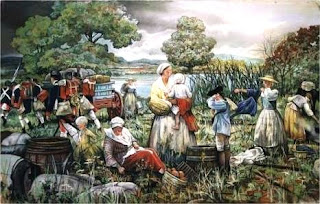“The number of Women and Children in the New York Regiments of Infantry . . . obliged me . . . to allow them Provision or, by driving them from the Army, risk the loss of a number of Men, who very probably would have followed their wives.” —George Washington to Major General Henry Knox
“A woman whose husband belonged to the artillery and who was then attached to a piece in the engagement attended her husband at the piece the whole time. While in the act of reaching a cartridge and having one of her feet as far before the other as she could step, a cannon shot from the enemy passed directly between her legs without doing any other damage than carrying away all the lower part of her petticoat. Looking at it with apparent unconcern, she observed that it was lucky it did not pass a little higher, for in that case it might have carried away something else.” —At Monmouth, from Diary of Joseph Plumb Martin
 |
| Molly Pitcher at Battle of Monmouth J. C. Armytage, c. 1859 |
 |
| Camp Follower Saluting General Washington |
Women followed an army for a variety reasons: They wanted to stay with their husbands. They needed an income. They were forced to flee from their homes and had no other options. The army provided a measure of safety, shelter, food, and work. In return the women also endured plenty of discomfort, hardships, and danger. They worked as hard and endured the same suffering as the soldiers. Some even broke out of traditional roles by serving in the ranks alongside their husbands. But a women had to be married to a soldier in order to get one of the limited number of the army’s paying jobs. If he died, she would have to marry another soldier within a short period of time to hold onto her job.
 |
| Doing laundry in a British camp |
Many women earned their rations by washing and mending clothing. Not only could women draw provisions, but they could also charge by the piece. The army regulated prices, however, and overcharging was a serious offense. Women also worked as cooks, but mostly for officers and support personnel such as blacksmiths, wheelwrights, and farriers. Regular soldiers formed “messes” composed of six men who shared chores such as hauling water, chopping wood, and cooking.
 |
| Following the Army, Pamela Patrick White |
Imagine being a camp follower in the 18th century. You’re lacking the comforts and conveniences of home, so daily chores are much harder and privacy virtually nonexistent. And you’re thrown into the company of women from a variety of social classes whose way of life and behavior are very different from yours. Plus you may often be on the road and in the midst of battle. What do you think would be your hardest challenges, especially if you also had children to care for?
~~~
J. M. Hochstetler is the daughter of Mennonite farmers, a lifelong student of history, and an author, editor, and publisher. Her American Patriot Series is the only comprehensive historical fiction series on the American Revolution. Book 6, Refiner’s Fire, releases in June 2019. Northkill, Book 1 of the Northkill Amish Series coauthored with Bob Hostetler, won Foreword Magazine’s 2014 Indie Book of the Year Bronze Award for historical fiction. Book 2, The Return, received the 2017 Interviews and Reviews Silver Award for Historical Fiction and was named one of Shelf Unbound’s 2018 Notable Indie Books. One Holy Night, a contemporary retelling of the Christmas story, was the Christian Small Publishers 2009 Book of the Year and a finalist in the Carol Award.

This was a great post! I never even thought of women following their husbands into battle in those days! You've gone into more detail than other snippets I've read about it. Thanks!
ReplyDeleteYou're so welcome, Connie! It was a different world back then for sure. lol!
DeleteA great post Joan! I knew some women were "camp followers" but did not realize how many. How hard that must have been for the women, espcially those with children. I can't imagine bringing children along during a war/battle.
ReplyDeleteBlessings, Tina
They were clearly made of sterner stuff back then, Tina. lol! I'm with you about the children. My mind boggles at the thought of managing child care, and even birth, while trailing an army!
ReplyDeleteIndeed Joan. We have become "soft" in so many ways.
ReplyDeleteToo many modern conveniences, Tina. lol!
DeleteThanks, Joan, for such an interesting post.
ReplyDeleteYou're welcome, Janet! Thanks for joining us. :-)
DeleteMy first message didn't show up. So, let's try this again. I could never be a camp follower!I'm that brave a person to have done something like that.The women were much stronger back then to be able do all the things that had to be done. Another great post, Joan!
ReplyDeleteNice post! I've always found this to be an amazing bit of history. Desperate times, desperate measures.
ReplyDelete